French Politics After 1800
Although he initially saw Napoleon Bonaparte’s military coup in November 1799 as the end of “anarchy”, Lafayette refused to endorse Napoleon’s dictatorship. Instead, he retired to La Grange and the life of a gentleman-farmer, while his son served as a sergeant in the army until 1807. In 1815, Lafayette led an envoy sent to “thank the Emperor for his abdication”. The throne of the Bourbons was restored, and Lafayette worked to resist their efforts to undermine the constitutional rights of the people – a free press and independent justice in particular – both as a deputy and as the grand-master of the French branch of the revolutionary secret society of Carbonari. In 1830, Lafayette was instrumental in dethroning reactionary Charles X and in helping Louis-Philippe to become “a bourgeois King” supposedly respectful of constitutional liberties.
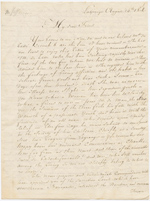 |
Lafayette. Letter to Thomas Jefferson (fragment - copy). La Grange, August 14, 1814. [zoom] With Paris occupied, Napoleon abdicated unconditionally on April 11, 1814 and was exiled to Elba, a small island off the coast of Italy. Although he escaped and returned briefly to power, his defeat at Waterloo (June 1815) would mark the end of his career. In this letter to Jefferson, Lafayette shares his thoughts about Napoleon’s abdication: The newspapers and ministerial correspondance [sic] will have apprised you of the successive events which have overthrown Bonaparte, introduced the Bourbons, and once more thrown the dice for the Liberties of France and of course of Europe. The strong powers and singular genius of Napoleon had been disharmonised [sic] by the folly of his ambition, the immorality of his mind, and his grain of madness not incompatible with great talents, but which is developed by the love and success of despotism... I wanted a National Insurrection against domestic despotism; I had no inclination to oppose measures tending to expel the destroyer of Liberty in Europe, and giving to France a chance to recover constitutional freedom... [And yet] hardly was the Imperial Sun set that the royal globe began to attract the hopes, and impress the fears... The aristocratical [sic] party is the same as you have known it.... |
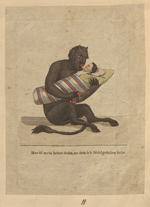 |
German Caricatures against Napoléon Bonaparte [between 1812 and 1815]. [zoom] | Additional images:  
Hardly an aristocrat, Bonaparte saw his opportunities enhanced by the Revolution. From the moment the French republic declared war on the European monarchies, its fate became directly tied to the successes of generals. Bonaparte turned from “Corsican kid” and anonymous officer into the commander in chief in Italy (at age twenty-seven!), into Consul (1799, extended to life in 1802), into Emperor of the French (1804), and King of Italy (1805), and into master of Europe. This came at a huge price: three million soldiers and another million civilians were killed. His hubristic dream failed because he could not extricate himself from Spain before invading Russia (1812). |
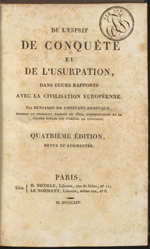 |
Benjamin Constant. De l’Esprit de Conquête et de l’Usurpation dans leurs Rapports avec la Civilisation Européenne [On the Spirit of Conquest and Usurpation]. Paris, 1814. [zoom] Lafayette’s copy, with his emblem and motto “Cur non?” (Why Not?) on the title page. Benjamin Constant was encouraged by his mistress Mme de Staël – with whom he sojourned in La Grange in 1801, and whose political exile he shared from 1802 to 1814 – to organize resistance to Bonaparte’s destruction of parliamentary power. According to the historian R.S. Alexander, in his De l’Esprit de Conquête... (first published in Hanover and London and banned in France), Constant portrayed the emperor as “an anachronistic warlord, fundamentally at odds with the pacific trends of modern society’s commercial orientation.” |
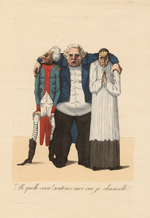 |
Caricature of King Louis XVIII Leaning upon an Aristocrat and a Priest. [1814 or 1815]. [zoom] Measures in favor of former émigrés and the restored Jesuits raised doubts about the promises made by Louis XVIII (a gouty king who lacked “Napoleonic” appeal) to forget past divisions. Republicans or Bonapartists exaggerated the closeness of the alliance between clergy and nobility, and raised the specter of a return to “feudalism” and “obscurantism.” |
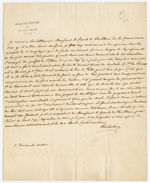 |
French Prime Minister Duke Armand-Emmanuel de Richelieu. Note to Interior Minister Comte Vincent de Vaublanc. [ca. 1815]. [zoom]
... I completely agree with Comte de Vaublanc about the necessity to employ only the National Guard as a tool of repression; besides we should avoid recreating factions and give up partisan politics... If we continue to see conspiracies everywhere, we will generate real ones. I think Viomésnil [the eighty-year-old military governor of Bordeaux] should be retiring under honorable conditions. By no means should we pursue his project to mobilize peasants... We must provide unity and reconciliation... Above all, there should be a single source of authority – the King....
This letter documents the “White Terror” (July 1815-September 1816), during which royalist militia exacted retribution against Jacobins and the “traitors” who had rallied around Napoleon. Moderates like Richelieu opposed the civil war tactics of ultra-conservatives like Viomésnil, a veteran of the Revolutionary Army in America turned general in the counter-revolutionary armies in Europe, who was pushed to retire with the rank of Marshal in 1816. |
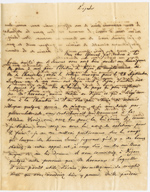 |
François Guizot. Letter to Lafayette. [Paris, August 22, 1829]. [zoom] | View/download a PDF of this item
I turn to you as a potential candidate in Dijon... One of the most influential notables here is Mr. Hernoux, the city’s former mayor and your ex-colleague in the Chamber.... A letter from you is likely to convince him to endorse me... This administration is increasingly insecure and paralyzed. Prime Minister Polignac needs glory, and he dreams of territorial expansion: this is but a red herring thrown out to France as to a snarling dog. They certainly won’t do anything until the new legislature, and thereafter they will either be drowned out in ridicule, or engage in risky adventures...
In 1829, the right to vote was the privilege of landowners, and candidates were pre-selected by high officials named by the King from among the richest and most “respectable” citizens. Yet those co-opted notables increasingly voted for centrist candidates suspicious of both absolute monarchy and revolution, and hostile to “distractive wars” (Algeria would soon become a French colony, 1830-1962). The son of a lawyer guillotined in 1794, François Guizot was a Professor of Modern History at the Sorbonne. He was eventually elected in Lisieux in January 1830, and played a major role in French politics after the July Revolution. |
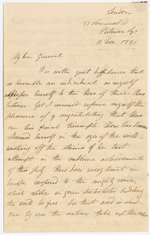 |
Mary Shelley. Letter to Lafayette. [London. 11 November, 1830]. [zoom] | View/download a PDF of this item The author of Frankenstein (1818) congratulates Lafayette on his part in the “Glorious Revolution” of July 1830. |